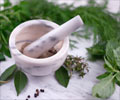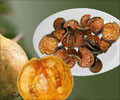People who eat or drink more foods with the antioxidant flavonol, which is found in nearly all fruits and vegetables as well as tea were 48 percent less likely to later develop Alzheimer's dementia, stated new research.

The study involved 921 people with an average age of 81 who did not have Alzheimer's dementia. The people filled out a questionnaire each year on how often they ate certain foods. They were also asked about other factors, such as their level of education, how much time they spent doing physical activities and how much time they spent doing mentally engaging activities such as reading and playing games.
The people were tested yearly to see if they had developed Alzheimer's dementia. They were followed for an average of six years. The researchers used various tests to determine that 220 people developed Alzheimer's dementia during the study.
The people were divided into five groups based on how much flavonol they had in their diet. The average amount of flavonol intake in US adults is about 16 to 20 milligrams per day. In the study, the lowest group had intake of about 5.3 mg per day and the highest group consumed an average of 15.3 mg per day.
The study found that people in the highest group were 48 percent less likely to later develop Alzheimer's dementia than the people in the lowest group after adjusting for genetic predisposition and demographic and lifestyle factors. Of the 186 people in the highest group, 28 people, or 15 percent, developed Alzheimer's dementia, compared to 54 people, or 30 percent, of the 182 people in the lowest group.
The results were the same after researchers adjusted for other factors that could affect the risk of Alzheimer's dementia, such as, diabetes, previous heart attack, stroke and high blood pressure.
Advertisement
People who had high intake of isorhamnetin were 38 percent less likely to develop Alzheimer's. Those with high intake of kaempferol were 51 percent less likely to develop dementia. And those with high intake of myricetin were also 38 percent less likely to develop dementia. Quercetin was not tied to a lower risk of Alzheimer's dementia.
Advertisement
Other limitations of the study are that the food frequency questionnaire, although valid, was self-reported, so people may not accurately remember what they eat, and the majority of participants were white people, so the results may not reflect the general population.
Source-Eurekalert















